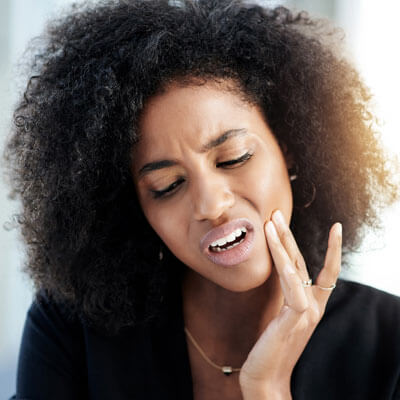TMJ Pain and Tooth Grinding (Bruxism) Treatment in Dubbo
Jaw Pain and Grinding Concerns
 The temporomandibular joints, often called TMJ, connect the jaw to the skull and allow movement for speaking, chewing, and yawning. When these joints or the surrounding muscles are strained, people may experience discomfort that affects everyday life. This condition is commonly referred to as a TMJ disorder. Tooth grinding, also known as bruxism, is often associated with these issues and can lead to further wear and damage to teeth if left untreated.
The temporomandibular joints, often called TMJ, connect the jaw to the skull and allow movement for speaking, chewing, and yawning. When these joints or the surrounding muscles are strained, people may experience discomfort that affects everyday life. This condition is commonly referred to as a TMJ disorder. Tooth grinding, also known as bruxism, is often associated with these issues and can lead to further wear and damage to teeth if left untreated.
What Causes TMJ Disorders and Bruxism?
Recognising the Symptoms
The signs of TMJ problems and bruxism vary. Persistent discomfort or visible changes in your teeth are strong reasons to seek professional advice. Common symptoms include:
- Jaw pain or tenderness
- Clicking or popping sounds when opening the mouth
- Frequent headaches or earaches
- Difficulty chewing or limited jaw movement
- Worn, chipped, or broken teeth
How TMJ Disorders and Bruxism Are Diagnosed
One of our dentists at Smile on Dubbo & Narromine will start by asking about your symptoms and daily habits. They may check your movement, listen for sounds during opening and closing, and assess for signs of tooth wear. Imaging such as X-rays may be recommended if more detail is needed. A careful assessment could help guide a plan to ease discomfort and support tooth protection.
Treatment Options That Make a Difference
TMJ and bruxism care often starts with simple, practical steps. A custom-fitted nightguard or splint may help protect teeth from grinding and reduce strain on the jaw joints. Stress management techniques, relaxation strategies, and gentle stretches can also help relieve muscle tension.
If teeth have been damaged, restorative dental work may be advised to repair their shape and function. In some cases, referral to another health professional is appropriate for further evaluation.
Benefits of Seeking Care
Addressing TMJ disorders and bruxism could help reduce discomfort, support tooth protection, and assist jaw function for some people. Protecting the teeth also helps prevent cracks, chips, or long-term wear.
Self-Care Tips to Ease Symptoms
At home, small changes may help reduce strain. Avoid chewing on hard foods or gum, apply warm compresses to relax the muscles, and practise relaxation exercises to manage tension. Consistency with these habits could help ease strain over time.
Learn More About Managing TMJ Concerns
If you’re struggling with jaw discomfort, frequent headaches, or tooth wear from grinding, our team is here to help. Contact Smile on Dubbo & Narromine today to arrange an assessment and learn about options that may help protect your teeth and support greater comfort.

